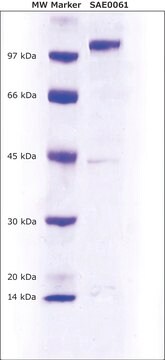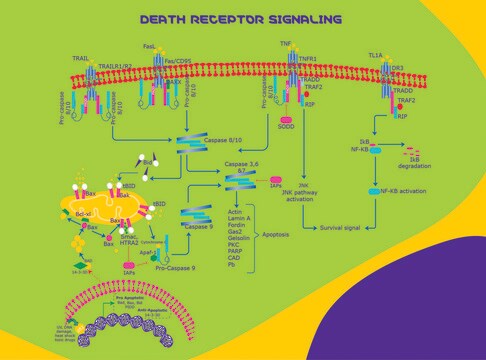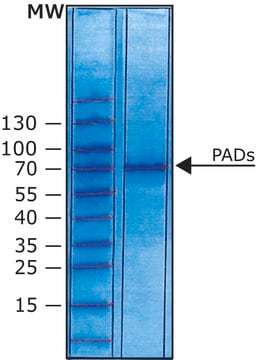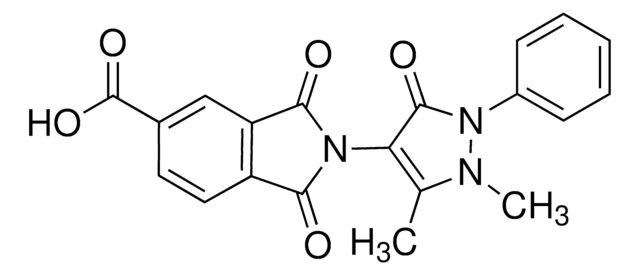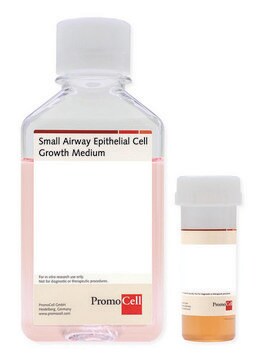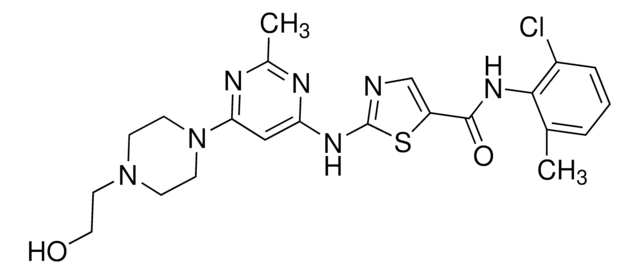SRP5223
PAD1, GST tagged human
recombinant, expressed in baculovirus infected Sf9 cells, ≥70% (SDS-PAGE), buffered aqueous glycerol solution
Synonym(s):
HPAD10, PADI1, PDI, PDI1
Sign Into View Organizational & Contract Pricing
All Photos(1)
About This Item
UNSPSC Code:
12352200
NACRES:
NA.32
Recommended Products
biological source
human
recombinant
expressed in baculovirus infected Sf9 cells
Assay
≥70% (SDS-PAGE)
form
buffered aqueous glycerol solution
mol wt
~95 kDa
NCBI accession no.
application(s)
cell analysis
shipped in
dry ice
storage temp.
−70°C
Gene Information
human ... PADI1(29943)
General description
Peptidyl arginine deiminase 1 (PAD1) is a member of the peptidyl arginine deiminase family of enzymes. It is a component of the 26S proteasome, a multiprotein complex that degrades proteins targeted for destruction by the ubiquitin pathway. PAD1 is expressed in the epidermis and uterus. The gene encoding this protein is localized on human chromosome 1p36.13.
Biochem/physiol Actions
Peptidyl arginine deiminases catalyze the post-translational deimination of proteins by converting arginine residues into citrullines in the presence of calcium ions. The overexpression of PAD1 induced a distinctive pattern of multidrug resistance in mammalian cells and moderate resistance to ultraviolet light. PAD1 is also responsible for substrate deubiquitination during proteasomal degradation. It deiminates filaggrin in the last stages of keratinocyte differentiation. Thus, PAD1 has a role in epidermis function and homeostasis. The protein has been genetically associated with rheumatoid arthritis.
Physical form
Supplied in 50mM Tris-HCl, pH 7.5, 150mM NaCl, 10mM glutathione, 0.1mM EDTA, 0.25mM DTT, 0.1mM PMSF, 25% glycerol.
Preparation Note
after opening, aliquot into smaller quantities and store at -70 °C. Avoid repeating handling and multiple freeze/thaw cycles
Analysis Note
This protein is not assayed for enzymatic activity.
Storage Class Code
10 - Combustible liquids
WGK
WGK 1
Flash Point(F)
Not applicable
Flash Point(C)
Not applicable
Choose from one of the most recent versions:
Certificates of Analysis (COA)
Lot/Batch Number
Don't see the Right Version?
If you require a particular version, you can look up a specific certificate by the Lot or Batch number.
Already Own This Product?
Find documentation for the products that you have recently purchased in the Document Library.
Citrullination of CXCL8 by peptidylarginine deiminase alters receptor usage, prevents proteolysis, and dampens tissue inflammation.
Proost P
The Journal of Experimental Medicine (2008)
Potential Role of Peptidylarginine Deiminase Enzymes and Protein Citrullination in Cancer Pathogenesis
Sunish Mohanan, et.la
Biochemistry Research International (2012)
The peptidylarginine deiminases expressed in human epidermis differ in their substrate specificities and subcellular locations.
Mechin MC
Cellular and Molecular Life Sciences (2005)
Identification of 45 novel SNPs in the 83-kb region containing peptidylarginine deiminase types 1 and 3 loci on chromosomal band 1p36.13.
Lida A and Nakamura Y
Journal of Human Genetics (2004)
Tingting Yao et al.
Nature, 419(6905), 403-407 (2002-09-28)
The 26S proteasome is responsible for most intracellular proteolysis in eukaryotes. Efficient substrate recognition relies on conjugation of substrates with multiple ubiquitin molecules and recognition of the polyubiquitin moiety by the 19S regulatory complex--a multisubunit assembly that is bound to
Our team of scientists has experience in all areas of research including Life Science, Material Science, Chemical Synthesis, Chromatography, Analytical and many others.
Contact Technical Service
